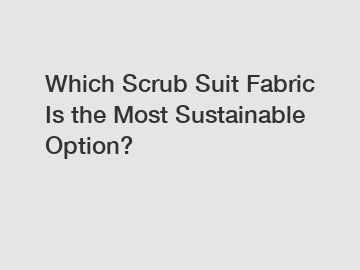Which Scrub Suit Fabric Is the Most Sustainable Option?
When it comes to choosing the most sustainable option for scrub suit fabric, healthcare professionals are increasingly considering not only the comfort and functionality of the material but also its environmental impact. With the growing awareness about sustainable practices, it is vital to assess the ecological footprint of the fabric used in medical uniforms. In this article, we will explore various fabrics commonly used in scrub suits and evaluate their sustainability based on factors such as production methods, resource consumption, and potential for recycling. So, let's delve into the eco-friendly options for scrub suit fabrics!
1. Organic Cotton:

Organic cotton stands out as one of the most sustainable fabric options for scrub suits. Grown without the use of chemical pesticides or synthetic fertilizers, organic cotton reduces the environmental impact associated with conventional cotton cultivation. By opting for organic cotton scrubs, healthcare professionals can contribute to the preservation of soil fertility, water quality, and biodiversity, while also promoting fair labor practices in cotton farming.
2. Bamboo:
Bamboo fabric, derived from the bamboo plant, offers a sustainable alternative for scrub suits. Bamboo is highly renewable, requiring minimal water, pesticides, or fertilizers for cultivation. Additionally, bamboo fabric possesses natural anti-bacterial properties, reducing the need for harsh chemical treatments during the manufacturing process. However, some concerns have been raised regarding the energy-intensive process of converting bamboo into fabric, as it often involves the use of chemicals. Opting for organic bamboo fabric can mitigate these concerns.
3. Hemp:
Hemp fabric is gaining popularity as a sustainable choice for scrub suits due to its environmentally friendly cultivation and manufacturing process. Hemp is naturally resilient, requiring no pesticides or herbicides for growth. Moreover, the production of hemp fabric consumes significantly less water compared to cotton. Additionally, hemp fabric is highly durable, making it a long-lasting option that reduces the frequency of replacement. By choosing hemp scrubs, healthcare professionals can actively contribute to reducing water consumption and pesticide usage.
4. Recycled Polyester:
While polyester fabric is known for its durability and wrinkle-resistant properties, traditional polyester production raises concerns due to its reliance on fossil fuels and energy-intensive manufacturing processes. However, recycled polyester, often derived from post-consumer plastic bottles, offers a more sustainable alternative. By repurposing plastic waste into fabric, recycled polyester reduces the demand for virgin materials and helps divert plastic from landfills. Opting for scrub suits made from recycled polyester can contribute to environmental conservation by minimizing resource consumption.
Conclusion:
In conclusion, healthcare professionals seeking environmentally friendly options for scrub suit fabric have a range of sustainable choices. Organic cotton stands as a reliable and sustainable choice, reducing chemical usage and promoting fair labor practices. Bamboo fabric offers a renewable alternative, though opting for organic bamboo is preferred to minimize chemical treatment concerns. Hemp fabric emerges as an environmentally friendly option, requiring significantly less water and no pesticides for cultivation. Lastly, recycled polyester provides a solution by repurposing plastic waste, contributing to resource conservation. Ultimately, the choice of the most sustainable fabric depends on factors such as personal preference, availability, and the desire to support specific eco-friendly practices. By carefully considering the environmental impact of their clothing choices, healthcare professionals can play an active role in promoting sustainability within the medical industry.
If you want to learn more, please visit our website cvc fabric for shirt, 100 cotton poplin, twill fabric used for uniforms.



Comments
Please Join Us to post.
0